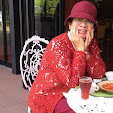The book title: Tak Semanis Impian written by Sharifah Abu Salem.
Resensi buku.
I have been away from the malay literary world for more than 20 years. The nearest reading material that I came across during that 20 years were some bits and pieces of newspaper clippings and some fashion magazines in bahasa melayu. I have been totally cut-off from the malay language and feel the need to upgrade when I foundout with lots of embarrassment, that I am still following the old spelling system in Bahasa Melayu. Actually, with the support of a very strong and determined person, Sdr Damahum, I found myself sincerely trying to improve myself with bahasa melayu. I have to write this in English (much to the dislike of my said-supporter) as I found myself still trying to climb the ladder of malay words step-by-step.
This is the first novel in Malay after more that 25 years, "Tak Semanis Impian" by Sharifah Abu Salem. From what I understand, this is a follow-up version of the first novel "Tak seindah Mimpi" but I missed reading the first version.
The book tells of the prohibited love of a young girl for her elder sister's husband. The story of the social rankings in the malay society, of the transformation of a village girl into an up-and-coming town girl, of the dealings in the private business world and the comparison of the simple life in the village with the buzzing life in metropolitan city.
The book mentioned much on the word "MasyaAllah" and I found the meaning in the book quite confusing with the actual meaning of this word that I know of.
The original meaning in Arab is "dengan kehendak Allah (SWT)" or "Allah (SWT) has willed it".
(Menyebut "masyaAllah" apabila memuji seseorang atau sesuatu), when expressing appreciation of someone or something for example.
"MasyaAllah, comelnnya anak itu" or masyaAllah, your wife is pretty.
We give praise to Allah (SWT) first before praising the subject or things mentioned.
But the malay language has taken a wrong version of the actual meaning of this beautiful word for example as noticed written abundantly in this book.
MasyaAllah! Mak tak terjaga subuh tadi!"
"Abang tak suka Seha duduk kat rumah abang agaknya!"
Suara Seha semakin hiba.
"MasyaAllah! Mengapa Norseha fikir macam tu?"
Razif makin tidak senang dengan Norseha".
I conclude with the shallow knowledge of the malay literary world, the word "masyaAllah" is confused with *masaalah=enigma (a person, thing or event that is strange or mysterious and difficult to understand or explain) or *masalah=problem.
This book also conveys the peculiar way some of the carry-ons are done in the business world. An inexperienced girl from a village being trust with the accounting of a successful firm, a previous-maid housewife being allowed to mingle and handle the decision-making machine of her husband private business. Maybe the writer has the intention of making this as a simple subplot but in reality this is obviously contradictory.
Some of the dialogue the characters used in English are grammatically disappointing like "You should have to be proud of her!" (pg 483) and "Dan I will spying of you!" (pg 484).
The writer has an effective way of showing the character's emotion, when Norjinah feels badly treated by her step-father. This emotion is strongly shown in the book and I have to force my tears from flowing during the death-bed speech when the father calls for his step-daughter
"Ji...mari dekat ayah nak!" (pg 533), at last acknowledging his step-daughter's kindness.
Being away from the malay community for more than 2 decades, I find this novel brought me back the nostalgia of the malay culture. Like having mid-afternoon meal. I realized that the malay has 4 meals a day, breakfast, lunch, mid-afternoon meal and dinner. Some of the writer's menu for the mid-afternoon meals are baked ubi bengkang (pg 43), pisang goreng and kuih (pg 373).
I write not with the intention of hurting the writer's feeling or giving criticism just for the sake of criticising. I write because I feel the writer needs to know that readers now are much more vocal and influential regarding their books and writings. I thoroughly enjoyed reading this novel and what I have written here is just my own humble opinion.
Wassalam,
Halela bte Abdul Razak
Okinawa, Japan.
21.12.2003
Sunday, December 21, 2003
Subscribe to:
Post Comments (Atom)


















No comments:
Post a Comment